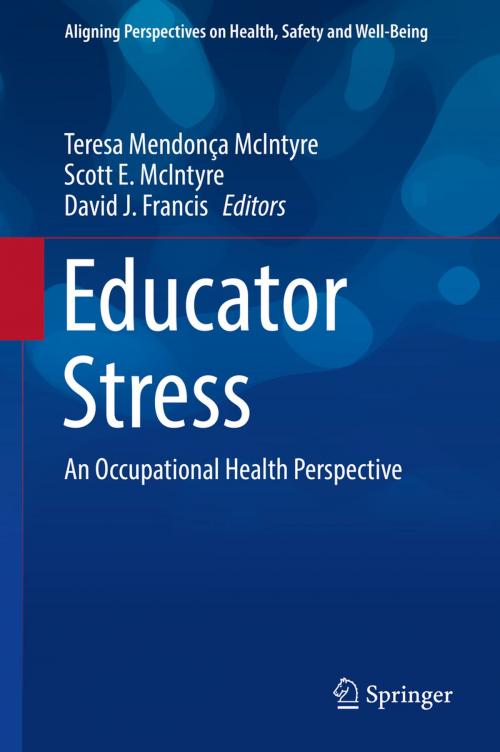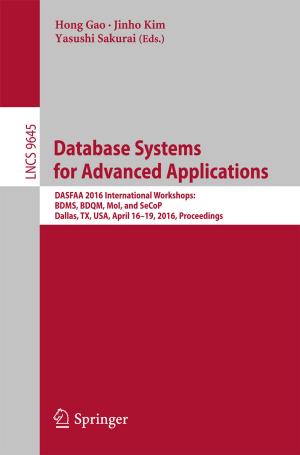Educator Stress
An Occupational Health Perspective
Nonfiction, Health & Well Being, Psychology, Occupational & Industrial Psychology, Business & Finance, Human Resources & Personnel Management| Author: | ISBN: | 9783319530536 | |
| Publisher: | Springer International Publishing | Publication: | August 28, 2017 |
| Imprint: | Springer | Language: | English |
| Author: | |
| ISBN: | 9783319530536 |
| Publisher: | Springer International Publishing |
| Publication: | August 28, 2017 |
| Imprint: | Springer |
| Language: | English |
This book brings together the most current thinking and research on educator stress and how education systems can support quality teachers and quality education. It adopts an occupational health perspective to examine the problem of educator stress and presents theory-driven intervention strategies to reduce stress load and support educator resilience and healthy school organizations. The book provides an international perspective on key challenges facing educators such as teacher stress, teacher retention, training effective teachers, teacher accountability, cyber-bullying in schools, and developing healthy school systems. Divided into four parts, the book starts out by introducing and defining the problem of educator stress internationally and examining educator stress in the context of school, education system, and education policy factors. Part I includes chapters on educator mental health and well-being, stress-related biological vulnerabilities, the relation of stress to teaching self-efficacy, turnover in charter schools, and the role of culture in educator stress. Part II reviews the main conceptual models that explain educator stress while applying an occupational health framework to education contexts which stresses the role of organizational factors, including work organization and work practices. It ends with a proposal of a dynamic integrative theory of educator stress, which highlights the changing nature of educator stress with time and context. Part III starts with the definition of what constitute healthy school organizations as a backdrop to the following chapters which review the application of occupational health psychology theories and intervention approaches to reducing educator stress, promoting teacher resources and developing healthy school systems. Chapters include interventions at the individual, individual-organizational interface and organizational levels. Part III ends with a chapter addressing cyber-bullying, a new challenge affecting schools and teachers. Part IV discusses the implications for research, practice and policy in education, including teacher training and development. In addition, it presents a review of methodological issues facing researchers on educator stress and identifies future trends for research on this topic, including the use of ecological momentary assessment in educator stress research. The editors’ concluding comments reflect upon the application of an occupational health perspective to advance research, practice and policy directed at reducing stress in educators, and promoting teacher and school well-being.
This book brings together the most current thinking and research on educator stress and how education systems can support quality teachers and quality education. It adopts an occupational health perspective to examine the problem of educator stress and presents theory-driven intervention strategies to reduce stress load and support educator resilience and healthy school organizations. The book provides an international perspective on key challenges facing educators such as teacher stress, teacher retention, training effective teachers, teacher accountability, cyber-bullying in schools, and developing healthy school systems. Divided into four parts, the book starts out by introducing and defining the problem of educator stress internationally and examining educator stress in the context of school, education system, and education policy factors. Part I includes chapters on educator mental health and well-being, stress-related biological vulnerabilities, the relation of stress to teaching self-efficacy, turnover in charter schools, and the role of culture in educator stress. Part II reviews the main conceptual models that explain educator stress while applying an occupational health framework to education contexts which stresses the role of organizational factors, including work organization and work practices. It ends with a proposal of a dynamic integrative theory of educator stress, which highlights the changing nature of educator stress with time and context. Part III starts with the definition of what constitute healthy school organizations as a backdrop to the following chapters which review the application of occupational health psychology theories and intervention approaches to reducing educator stress, promoting teacher resources and developing healthy school systems. Chapters include interventions at the individual, individual-organizational interface and organizational levels. Part III ends with a chapter addressing cyber-bullying, a new challenge affecting schools and teachers. Part IV discusses the implications for research, practice and policy in education, including teacher training and development. In addition, it presents a review of methodological issues facing researchers on educator stress and identifies future trends for research on this topic, including the use of ecological momentary assessment in educator stress research. The editors’ concluding comments reflect upon the application of an occupational health perspective to advance research, practice and policy directed at reducing stress in educators, and promoting teacher and school well-being.















